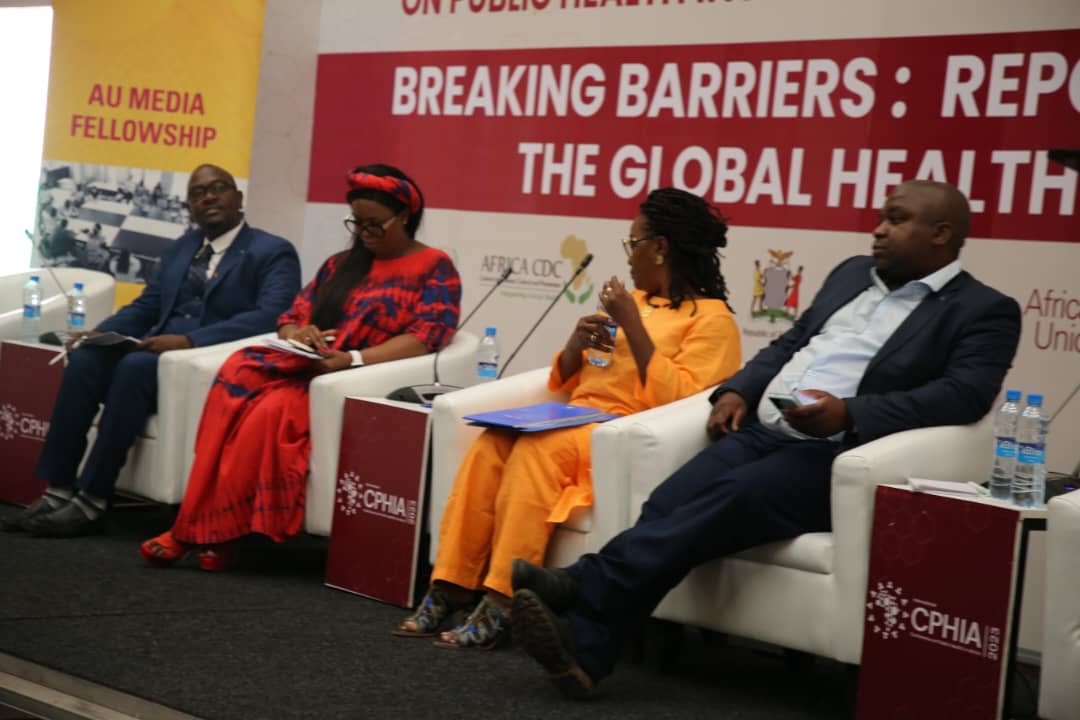Researchers, health experts and media professionals have given reasons people should be put at the centre of health emergency preparedness through risk communication and community engagement and social behaviour change mechanisms.
They demand effective deployment of the mechanisms, including compelling storytelling approaches, to prepare communities for future pandemics and make them better informed to guide against mis-and disinformation that derails emergency response efforts.
“We have seen what has worked with the massive investment we have done through Covid-19. We are still doing a lot of investment particularly in the RCCE and SBC area. We hope this has created a strong foundation on which we can build a much more robust system in the future that can have RCCE and SBC at the heart of the strategies,” Dr Richard Mihigo, Director Covid-19 Delivery, Coordination and Integration at GAVI, declared during a panel session at a side event themed, ‘Strengthening the Continental Risk Communication and Community Engagement (RCCE) and Social Behaviour Change (SBC) Architecture: Preparing Communities for the Next Pandemic’ at the 3rd International Conference on Public Health in Africa (CPHIA 2023) in Lusaka, Zambia.
“When it comes to outbreaks or pandemics, if we don’t have a strong foundation, any activity will be reactive and will not necessarily bear the fruit that we want,” he added.
Pandemics: African leaders urged to prioritise risk communication, community engagement
It is high time we start preparing for future pandemics
Drawing on Covid-19 experience, Dr Mihigo said it is imperative to build a system that can be quickly scaled up to respond to emergencies.
“Workforce development is also a critical area that we need to continue to support. We are really keen to fund this area because during Covid, we saw that sometimes, the health workers were part of those spreading misperception around vaccination.
“We should ensure that we listen to community needs. There can never be a one-size-fits-all approach. We need to listen to the concerns of each community and each country and design our interventions based on the social understanding of the local communities,” he stated.
On how to bridge the gap between public health policies and practice working at cross-purpose, another panelist, Gloria Lihemo, an SBC specialist at UNICEF, urged governments and partners across the continent to work together and design models that significantly benefit the people.
“We need to think outside of the box in experimenting some of the interventions evidence has shown work. For instance, how do we use cash incentives and message primes to be more effective in engaging with communities? Speed is obviously everything in evidence generation especially during pandemics. If in two and a half weeks, we haven’t responded to community concerns, then it is almost too late to get back to them with information they need to address those concerns,” she explained.
Lihemo noted that a good basis for pandemic preparedness is investing in good quality SBC now and integrating SBC and social data into a wider and broader health system data.
She further stressed the need to make risk communication compelling and people-centred, noting that the current model focused more on cryptic data-based communication without really engaging the communities.
“We need to focus more on how to make our data communication more personal so they can resonate with the communities. Also, when we are looking at social data, we focus on the demand side of the evidence generation forgetting that we also need to focus on the supply side which also has behaviour underpinnings.
“During Covid-19, we spent so much time looking at vaccine hesitancy whereas the bulk of the problem was people not having access to the vaccination or even a simple knowledge of where they can get vaccinated. We need to look at those two components as very complementary parts of our healthy immunisation system and address them together in our RCCE evidence generation,” Lihemo said.
She appealed to African countries to sustain investment in social listening mechanisms and training of local capacity during the Covid-19 pandemic so they could be deployed in other areas such as malaria vaccination to properly address community concerns.
Redemptus Alphonce, SBC Campaign Lead at Access Challenge, advised that local partners should be allowed to lead building of appropriate channels of communication in RCCE interventions.
“They (local partners) are close to the grassroots; they understand the genesis of rumours and the language that can demystify them. We have to bring everybody to the table; co-creating on the solutions is very critical. We need to listen to all stakeholders, develop channels to gather relevant facts and we need to contextualise the information because what is factual in one area may be taken differently in another context,” she stated.
Earlier in her remarks at a press briefing, Co-Chair of CPHIA 2023 organised by Africa Centres for Disease Control and Prevention (Africa-CDC), Prof Margaret Gyapong, disclosed that Africa is making an unprecedented leap in health technology innovation – from mobile phone applications that provide remote consultations, to telemedicine platforms that connect patients with specialist care, thereby bridging the gaps in the healthcare access and delivery.
“The digital disease surveillance which was pivoted by Africa-CDC in six countries is developing digital surveillance indicators and online disease dashboards based on social media and search engines to inform infectious disease surveillance in the continent,” she remarked.
Gyapong, who is the Director of the Institute of Health Research, University of Health and Allied Sciences, stated that the intiative had been driving interventions and building capacity for outbreaks prediction, analysis and prevention, attributing the success to robust collaborations between governments, private sector and civil society organisations.

 Join Daily Trust WhatsApp Community For Quick Access To News and Happenings Around You.
Join Daily Trust WhatsApp Community For Quick Access To News and Happenings Around You.


